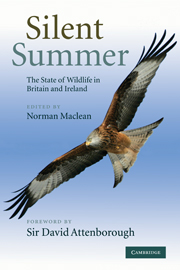Book contents
- Frontmatter
- Contents
- List of contributors
- Foreword
- Preface
- Acknowledgements
- List of abbreviations
- 1 Introduction
- PART I FACTORS DRIVING CHANGES IN WILDLIFE
- 2 Climate change
- 3 Agriculture, woodland and semi-natural habitats
- 4 Vertebrate animal introductions
- 5 Plant introductions
- 6 Urbanisation and development
- 7 The Great Game: the interaction of field sports and conservation in Britain from the 1950s to 2008
- 8 Going fishing: recent trends in recreational angling
- 9 Impacts of hormone-disrupting chemicals on wildlife
- 10 Water pollution: other aspects
- 11 Twenty-five key questions in ecology
- PART II CONSERVATION IN ACTION
- PART III THE CASE HISTORIES
- Glossary
- Name index
- Subject index
- Plate section
- References
6 - Urbanisation and development
Published online by Cambridge University Press: 05 August 2012
- Frontmatter
- Contents
- List of contributors
- Foreword
- Preface
- Acknowledgements
- List of abbreviations
- 1 Introduction
- PART I FACTORS DRIVING CHANGES IN WILDLIFE
- 2 Climate change
- 3 Agriculture, woodland and semi-natural habitats
- 4 Vertebrate animal introductions
- 5 Plant introductions
- 6 Urbanisation and development
- 7 The Great Game: the interaction of field sports and conservation in Britain from the 1950s to 2008
- 8 Going fishing: recent trends in recreational angling
- 9 Impacts of hormone-disrupting chemicals on wildlife
- 10 Water pollution: other aspects
- 11 Twenty-five key questions in ecology
- PART II CONSERVATION IN ACTION
- PART III THE CASE HISTORIES
- Glossary
- Name index
- Subject index
- Plate section
- References
Summary
Summary
Over the last 50 years, the human population of the UK (Britain and Northern Ireland, excluding overseas territories) has both expanded and become substantially more urbanised. The consequences for wildlife have undoubtedly been complex, with the low priority that has been given to monitoring schemes in urban environments compounding the difficulty in drawing overall conclusions. Nonetheless, it is clear that substantial areas of natural and semi-natural habitats have been lost, and that the richness and abundance, particularly of more specialist and previously narrowly distributed species associated with these habitats, have declined. Conversely, some more generalist species have greatly benefited, as have others that could exploit some of the more novel environments occurring in urban areas. Moreover, urban areas have become more significant for wildlife over the past 50 years, in large part because they figure more prominently in landscapes, because of a marked increase in awareness of and conservation efforts for urban biodiversity, and because urban areas hold a substantial proportion of the national populations of some species that have experienced dramatic declines in the wider countryside.
Introduction
Over the last 50 years the human population of the UK has grown by more than 15% (Figure 6.1; from 52.8 million in 1961 to 60.6 million in 2006; National Statistics 2007a). The annual growth rate has been an order of magnitude higher in urban areas than in rural ones, such that over 90% of the population now lives in the former.
Information
- Type
- Chapter
- Information
- Silent SummerThe State of Wildlife in Britain and Ireland, pp. 72 - 83Publisher: Cambridge University PressPrint publication year: 2010
References
Accessibility standard: Unknown
Why this information is here
This section outlines the accessibility features of this content - including support for screen readers, full keyboard navigation and high-contrast display options. This may not be relevant for you.Accessibility Information
- 2
- Cited by
